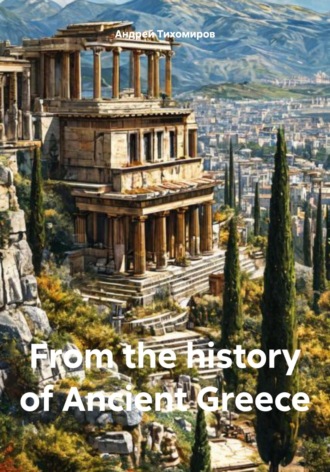
Полная версия
From the history of Ancient Greece

Андрей Тихомиров
From the history of Ancient Greece
Relations between cities and nations
In ancient Greece, there were several ways of interaction between cities and nations. One of the most ancient and important was the institute of hospitality, which was called Proxenia. Proxens are people who enjoyed special rights and privileges in the city where they were received. They helped local residents, participated in negotiations and defended the interests of their cities. Proxenia helped to strengthen ties between the cities and promoted the development of trade and diplomacy.
Another important institution was the "amphictyony" – religious unions that arose around temples. These unions included tribes living near the temple, regardless of their kinship. The main purpose of amphictyony is common holidays, the protection of the temple and its treasures, and the maintenance of peace. Wars were forbidden during the holidays, which helped to maintain peace and security. The most famous example of amphictyony was the Delphi-Thermopylae amphictyony, which united 12 tribes. Each tribe had two votes, which made amphictyony an important political institution.
These ancient traditions helped the Greeks to better understand each other and cooperate, which contributed to the development of their culture and society.
Amphictyonia was a union of ancient Greek cities that united to defend a common cause. They had their own meeting, which took place twice a year, in spring and autumn, at the sacred sites of Thermopylae and Delphi. Important issues were resolved at this meeting and laws were passed that are binding on all participants. The main thing in amphictyony were hieromonts, special people who were chosen from each city. They made sure that everyone kept the peace and organized religious holidays.
In the 5th and 4th centuries BC, another important group appeared – the Pilagoras. They helped the hieromonks and made sure that the cities fulfilled their obligations. The Delphi-Thermopylae amphictyony was very influential. She could declare and end wars, appoint and remove rulers. The priests at Delphi were considered heralds of the will of the god Apollo. They had secret books with ancient predictions that were read only by a select few. One of the most powerful weapons of amphictyony was the holy wars. If someone harmed the temple of Apollo, all members of the amphictyony had to speak out against the violator.
All important treaties and decisions in Greece were approved with the participation of the Delphic priests. They were asked for advice on controversial issues. The priests were very influential due to their spiritual and material wealth. In addition to Amphictyonia, there were other unions in Greece, such as the Lacedaemonian and Athenian Symmachia. The Lacedaemonian Symmachia united the cities of the Peloponnese under the leadership of Sparta. All cities had one vote, and decisions were made by a majority. Such alliances helped cities defend themselves, negotiate and live in peace.
In ancient Greece, there were alliances of cities that helped each other defend themselves from enemies. One of these unions was the Athenian, or Delian, Symmachia. It included the cities that paid a contribution to the general treasury on the island of Delos. Athens played a major role in the alliance.
Over time, the Delian Symmachia turned into an Athenian state, or arche. However, relations with another major alliance, the Lacedaemonian Symmachia, which was led by Sparta, were hostile. This led to the long and bloody Peloponnesian War.
Conflicts between cities and polises were resolved with the help of ambassadors. In ancient Greece, they were called messengers or elders. Usually, the ambassadors were chosen from respected and wealthy citizens. They had to be eloquent and have Proxenoid friends in other cities. Sometimes actors became ambassadors. For example, the famous orator Aeschines was an actor and represented Athens before the Macedonian king Philip II. The actor's skill helped the ambassadors to speak convincingly at large gatherings.
The number of ambassadors was not strictly defined. All of them were considered equal, but later the main ambassador appeared – the arch-queen. Money was allocated for the maintenance of the ambassadors, and they were also given letters of recommendation to the proxenos in the city where they were going. Ambassadors played an important role in the life of the ancient Greeks. They helped negotiate peace, trade, and defend their cities.
The ambassadors were important people who represented their countries in other cities. They had strict instructions, but they could act on their own. Arriving at the place, the ambassadors went to the main man of the city, who was engaged in diplomacy. They showed him their documents and received advice. After a few days, the ambassadors told the people or important people about the purpose of their visit. Then discussions began or a special commission was created to consider the issue.
The ambassadors were treated with respect: they were well received, given gifts, invited to parties and games. When they returned home, they talked about their mission. If everything was fine, they were given rewards, such as a laurel wreath and an invitation to lunch in a special building. Anyone could express their opinion about the ambassador's work.
One of the main tasks of the ambassadors was to form alliances and sign treaties. In those days, treaties were considered very important and sacred. If someone violated the contract, it was considered bad luck, and a curse could be placed on him. Therefore, oaths and curses were part of the signing of the contract.
If someone violated the agreement, the disputes were referred to a special commission. The perpetrators were punished, for example, by being forced to pay a large sum of money. If the city did not want to pay, military operations could begin. After the agreement was concluded, each party had to carve the text of the contract and the oath on a special stone slab and store it in the main temple. In Athens, it was the temple of Pallas Athena on the Acropolis. The most important treaties were also kept in other important places such as Delphi, Olympia and Delos.
The texts of the agreements were written in several languages so that all parties could understand them. One copy was necessarily left in the state archive. If relations between the countries deteriorated or a war broke out, the slab with the text of the treaty was broken, and the treaty was considered terminated.
Конец ознакомительного фрагмента.
Текст предоставлен ООО «Литрес».
Прочитайте эту книгу целиком, купив полную легальную версию на Литрес.
Безопасно оплатить книгу можно банковской картой Visa, MasterCard, Maestro, со счета мобильного телефона, с платежного терминала, в салоне МТС или Связной, через PayPal, WebMoney, Яндекс.Деньги, QIWI Кошелек, бонусными картами или другим удобным Вам способом.









